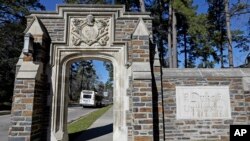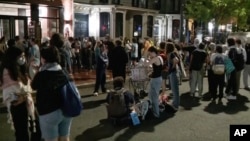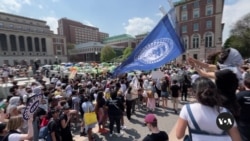Student Union
Helping International Students Through: 5 Questions with International Student Advisor Lee Seedorff
Lee said the University of Iowa begins talking with international students before they even arrive on campus, offering pre-arrival checklists to prepare students for what they need to know to come to America, and then continuing with orientations and special programs to help international students navigate their life in the U.S.
So after all that communication experience, what does an international student advisor have to say about communicating with international students? Here are Jane’s 5 questions with Lee Seedorff.
1. What are the most common topics during your communication with international students?
Lee: Well, just by the nature of what we do a lot of it is immigration-related. Students are coming in because they may need to extend an immigration document or need authorization for something, or to make sure they are following the immigration rules they are supposed to follow. Much of what we do is related to that.
But outside of that, there is still a fair amount of just personal issues. Maybe people are having conflicts with their roommates - that’s definitely a common one. Or sometimes workplace, particularly with graduate students - they’re having conflicts with their graduate advisor or lab supervisor.
At the beginning of the semester we see more adjustment issues. Students feeling they are not connected, they are feeling lonely, like they want to go home.
Hear Lee talk about how the University of Iowa stays in touch with foreign students:
2 So when you talk to international students, do you encounter some communication challenges, like some students who can’t speak fluent English?
Lee: Sometimes. But I will say that’s actually rare. Most of the students who are coming here have pretty good English conversational skills, so just meeting and discussing something with a student in person it’s rare that I encounter problems like that.
Definitely there are some names that are difficult for me to figure out how to pronounce. But from time to time we have workshops for our office staff and invite people in to go over name pronunciation. We have done that a couple of times with, for example, Chinese names. So I am not going to say I am that good, but I am probably better than many Americans are.
Of course, because you have encountered so many Chinese students, right?
Lee: Yes, we have good practice. But definitely, there are other Thai names, Vietnamese names. We always have some practice we need to do, definitely.
3. For many international students, they haven’t had a lot of chances to talk to American people, so when they communicate with you, would you give them some suggestions on how to improve their communication skills or other things?
Lee: Sometimes students do ask us about that. For example, just a few weeks ago I had a student asking me what’s considered rude in American culture. He gave me a couple of examples of some things that had just happened to him in a store when he was making a purchase, or in a conversation with someone on the street. [He wanted to know] whether or not the person he was speaking to, who was an American, was being rude to him or if that was normal behavior.
4. Could you tell us about a time you felt particularly unsatisfied with your abilities to help a student?
Lee: I think most often when I was unsatisfied or when I was very frustrated it has to do with when students are caught up in immigration regulations that don’t permit them to do something. Or there’s an administrative process that’s happening and we cannot get that resolved.
It’s truly frustrating because those types of things really impact peoples’ lives, and that shouldn’t be the case. I mean, bureaucracy should never end up meaning somebody has to go home, but unfortunately that has happened. I am not talking about people who violate immigration laws, but I am talking about just the timing of when an application received, those types of things. It is frustrating.
And then the other thing that can be really difficult is when there are mental health issues that just can’t be solved, and can’t be helped sufficiently. So sometimes that means students do have to end up going home as well.
5. Do you have any suggestions for international students on how to be successful in society, social life, their personal life?
Lee: I guess the number one suggestion would be: always seek out sources of help. Whether it’s talking to your professors or your teaching assistants if you are struggling in a class, talking to our office, your academic advisor.
For students who are really struggling or feeling emotionally down and depressed, we recommend our campus counseling office. I know for some students that’s not the natural place that they would consider going, but we are really fortunate where we have a counseling office who actually has psychologists on staff who were international students themselves and understand what a lot of the students are going through. So that’s always a good resource we encourage students to go to.
We encourage students to get involved with campus activities. And also, it’s hard, but to meet to other students outside of your comfort zone, particularly either American students or students from other places where you are not from. That’s where the big challenge is: what do you do, because they are probably shy and don’t know what to talk about, just like you do. But what do you do to step out of your comfort zone and try to make that connection? So we try to help with that when we can.
So just encourage them to step out and open their mind, right?
Lee: Sometimes, it is just like jumping in the pool, you know? You just have to hold your breath and do it.
Listen to this conversation:
See all News Updates of the Day
Protests dwindle to tiny numbers, subtle defiant acts at US college graduations

A tiny contingent of Duke University graduates opposed pro-Israel comedian Jerry Seinfeld speaking at their commencement in North Carolina Sunday, with about 30 of the 7,000 students leaving their seats and chanting "free Palestine" amid a mix of boos and cheers.
Some waved the red, green, black and white Palestinian flag. Seinfeld, whose decade-long namesake show became one of the most popular in U.S. television history and who continues to draw legions of fans to his Netflix specials and TV appearances such as "Comedians in Cars Getting Coffee," was there to receive an honorary doctorate from the university.
"After spending four years at what is considered one of the finest institutions of higher education in the world, they apparently feel that perhaps some light entertainment will get you all to the final realization, 'You know, I think I've really had enough of this place,'" Seinfeld said.
The stand-up turned actor and recent star, director and co-writer of the movie "Unfrosted," has publicly supported Israel since it invaded Gaza to dismantle Hamas after the organization attacked the country and killed some 1,200 people in southern Israel on Oct. 7. The ensuing war has killed nearly 35,000 people in Gaza, mostly women and children, according to Gaza's Health Ministry, which doesn't distinguish between civilians and combatants.
Students at campuses across the U.S. responded this spring by setting up encampments and calling for their schools to cut ties with Israel and businesses that support it. Students and others on campuses whom law enforcement authorities have identified as outside agitators have taken part in the protests from Columbia University in New York City to UCLA.
At the University of California, Berkeley, on Saturday, a small group of pro-Palestinian demonstrators waved flags and chanted during commencement and were escorted to the back of the stadium, according to the San Francisco Chronicle. There were no major counterprotests, but some attendees voiced frustration.
"I feel like they're ruining it for those of us who paid for tickets and came to show our pride for our graduates," said Annie Ramos, whose daughter is a student. "There's a time and a place, and this is not it."
The small student protest Sunday at Duke's graduation in Durham, North Carolina, was emblematic of campus events across the U.S. Sunday after weeks of student protests roiled U.S. campuses in recent weeks and resulted in nearly 2,900 arrests at 57 colleges and universities.
This weekend's commencement events remained largely peaceful.
At Emerson College in Boston, some students took off their graduation robes and left them on stage. Others emblazoned "free Palestine" on their mortar boards. One woman, staring at a camera broadcasting a livestream to the public, unzipped her robe to show a kaffiyeh, the black and white checkered scarf commonly worn by Palestinians, and flashed a watermelon painted on her hand. Both are symbols of solidarity with those living in the occupied territories.
Others displayed messages for a camera situated on stage, but the livestream quickly shifted to a different view, preventing them from being seen for long. Chants during some of the speeches were difficult to decipher.
Protests at Columbia University, where student uprisings inspired others at campuses across the country, led the school to cancel its main graduation ceremony in favor of smaller gatherings.
The University of Southern California told its valedictorian, who publicly backed Palestinians, that she could not deliver her keynote speech at its graduation ceremony because of security concerns. It later canceled its main graduation ceremony.
At Depaul University in Chicago, graduation is more than a month away. But as the academic year closes, school leaders said they had reached an "impasse" with the school's pro-Palestinian protesters, leaving the future of their encampment on the Chicago campus unclear.
The student-led DePaul Divestment Coalition, which is calling on the university to divest from economic interests tied to Israel, set up the encampment nearly two weeks ago. The group alleged university officials walked away from talks and tried to force students into signing an agreement, according to a student statement late Saturday.
- By VOA News
Students weigh in on how colleges can prepare undergrads for work

Inside Higher Ed surveyed undergraduates on the best way to prepare for the workforce.
One group of students in Oregon built a for-profit snowboarding business as part of their degree. Colleen Flaherty reports. (April 2024)
- By VOA News
Many African students are experiencing US visa rejections

In 2022, 71% of student visa applications from Western Africa were rejected.
Visa agents are not happy – and are finding ways to help applicants with paperwork and the interview. Maina Wururu reports for The PIE News. (April 2024)
- By Tina Trinh
US college students face muted graduations amid Gaza war protests
Commencement ceremonies are being scaled back or canceled at U.S. universities because of security concerns over pro-Palestinian student protests. While some campus demonstrations have resulted in concessions, others have led to violent confrontations. VOA’s Tina Trinh has the story from New York.
- By Melos Ambaye
Police arrest 33 at George Washington University protest encampment

Police in Washington cleared a pro-Palestinian protest encampment at George Washington University early Wednesday, arresting 33 people, authorities said.
Arrests were made on charges of assault on a police officer and unlawful entry, the District of Columbia's Metropolitan Police Department said.
A congressional committee canceled a hearing on the university encampment Wednesday. D.C. Mayor Muriel Bowser and Washington Police Chief Pamela Smith had been scheduled to testify about the city’s handling of the protest before the House Committee on Oversight and Accountability.
University parents and faculty members gathered Wednesday afternoon for a press conference to condemn the handling of the protests by police and school leaders.
“The university clearly does not value the students at all and has endangered the safety of our children by unleashing officers dressed in full riot gear to assault and spray our children in their eyes with pepper spray,” said Hala Amer, whose son participated in the campus protests.
Police said they dispersed demonstrators because "there has been a gradual escalation in the volatility of the protest."
American University professor Barbara Wien said she stayed in the encampment with GW students. She described the student protesters as democratic and peaceful.
Police started to shut down the tent encampment after dozens of protesters marched to GW President Ellen Granberg's on-campus home on Tuesday night. Police were called, but no arrests were made.
Speakers at the conference called for Granberg’s resignation because, they alleged, she refused to meet and negotiate with student protesters.
“You keep inciting violence and ignoring the students,” Amer said about Granberg in an interview with VOA after the conference. “It will just lead to more violence. You need to talk to your students.”
GW officials warned students that they could be suspended for engaging in protests at the school’s University Yard, an outdoor spot on the campus.
"While the university is committed to protecting students' rights to free expression, the encampment had evolved into an unlawful activity, with participants in direct violation of multiple university policies and city regulations," a GW statement said.
More than 2,600 people have been arrested at universities across the country in pro-Palestinian protests, according to The Associated Press.
Students are calling on their university administrations to divest investments from Israel or companies with ties to Israel. Demonstrators have gathered in at least 50 campuses since April 17, carrying signs that read "Free Palestine" and "Hands off Rafah."
Rafah is Gaza’s southernmost city, where most of the territory’s population has clustered. The area is also a corridor for bringing humanitarian aid into the Palestinian territory.
Israel seized the Gaza side of the Rafah crossing on Tuesday, while shutting off the nearby Kerem Shalom crossing, drawing criticism from humanitarian groups. Israel said Wednesday that it had reopened Kerem Shalom.
The nationwide campus protests started in response to Israel's offensive in Gaza that began after Hamas launched a terror attack on Israel on October 7, killing about 1,200 people and taking roughly 250 hostages.
More than 34,000 Palestinians have been killed in Israel's offensive, according to the Gaza Health Ministry. Israel warned it could "deepen" its operation in Rafah if talks failed to secure the release of the hostages.
Some information for this report came from The Associated Press.









